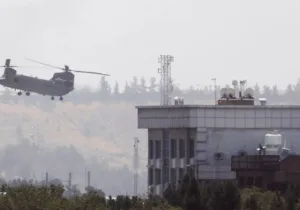The nations that ratified a global Arms Trade Treaty are gathering for their third annual conference this week in Geneva, Switzerland. Here is what you should know about this treaty on conventional arms.
What is the Arms Trade Treaty?
The Arms Trade Treaty (ATT) is a U.N.-sponsored multinational agreement to regulate the international trade in conventional arms—which the U.N. describes as being “from small arms to battle tanks, combat aircraft and warships”—and to prevent and eradicate illicit trade and diversion of conventional arms by establishing international standards governing arms transfers. The treaty was entered into force on December 24, 2014.
What is the purpose of the ATT?
The stated objective of the treaty is to “establish the highest possible common international standards for regulating or improving the regulation of the international trade in conventional arms and prevent and eradicate the illicit trade in conventional arms and prevent their diversion.” It does so for the purpose of “contributing to international and regional peace, security and stability; reducing human suffering; promoting cooperation, transparency and responsible action by States Parties in the international trade in conventional arms, thereby building confidence among States Parties.”
What does the ATT actually do?
According to the Arms Control Association, the ATT contains a number of requirements. Primarily, all states-parties are obligated to adopt basic regulations and approval processes for the flow of weapons across international borders, to establish common international standards that must be met before arms exports are authorized, and to require annual reporting of imports and exports to a treaty secretariat.
In particular, the treaty: requires that states “establish and maintain a national control system, including a national control list” and “designate competent national authorities in order to have an effective and transparent national control system regulating the transfer of conventional arms.”
What “conventional arms” does the ATT apply to?
The ATT applies to the following categories of conventional weapons: battle tanks, armored combat vehicles, large-caliber artillery systems, combat aircraft, attack helicopters, warships, missiles and missile launchers, and small arms and light weapons.
What constitutes “trade” in conventional arms?
Under the treaty, activities of international trade are comprised of export, import, transit, trans-shipment, and brokering of conventional arms.
How many countries have signed or ratified the ATT?
To date, the ATT has a total of 92 States Parties and 130 Signatory States.
Secretary of State John Kerry signed the ATT on behalf of the United States on September 25, 2013, but the U.S. Senate has refused to ratify the treaty.
China, India, Iran, Pakistan, Russia, and many other major arms exporters and importers are not party to the ATT and have stated that they will not become party to it.
Why has the Senate refused to ratify the treaty?
Although the Obama Administration signed the ATT in September 2013, it waited until December 9, 2016, to transmit the treaty to the Senate.
However, years before the treaty was sent for ratification—or even finalized—Republican senators were already expressing their opposition. In 2012 Kansas Senator Jim Moran led 50 senators in “expressing grave concern about the dangers posed to Americans’ Second Amendment rights by the United Nations’ Arms Trade Treaty.”
Opposition to the treaty was also included in the 2016 Republican Party platform.
A series of appropriations acts, such as the Section 7062 of the Consolidated Appropriations Act of 2016, have also banned implementation of funding, as does Section 1285 of the fiscal year 2017 National Defense Authorization Act.
“Congress’ opposition is well founded,” says Theodore Bromund of the Heritage Foundation. “There is no basis for President Obama’s assertion that the treaty will ‘persuade other States to adopt national control systems for the international transfer of conventional arms that are closer to our own high standards.’ Nations that do not have the ability or the desire to adopt effective controls on their arms exports will not be enabled to improve or persuaded to act by a treaty.”
—
Joe Carter is an adjunct professor of journalism at Patrick Henry College, an editor for several organizations, and the author of the NIV Lifehacks Bible.
Photo Credit: Lance Cpl. Jeremy Coltharp, a machine gunner with India Company, 3rd Battalion, 3rd Marine Regiment, holds links of ammunition for Lance Cpl. Andrew Ellis to fire during a company attack at Range 400 on Marine Corps Air Ground Combat Center Twentynine Palms, Calif., Sept. 10, 2011. Marine Corps Photo.






